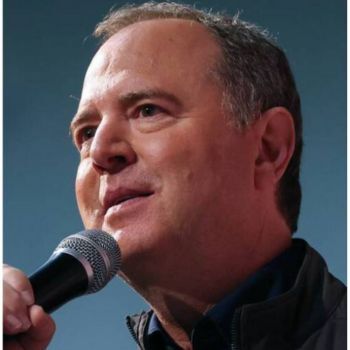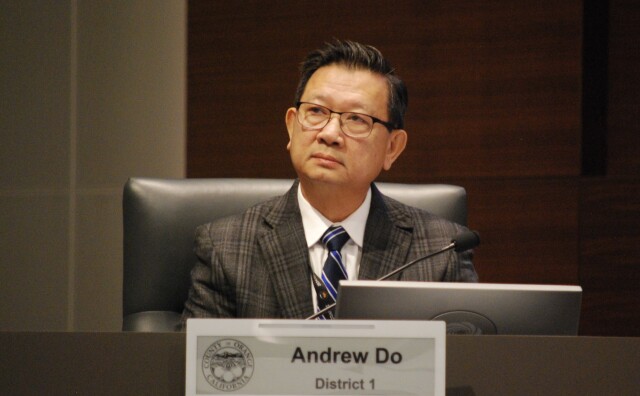Voters will choose a Californian who enjoys spirited debate, deliberating on presidential appointments and sometimes passing actual legislation. Although there is a full slate of candidates, the choice really comes down to Democratic Rep. Adam Schiff and Republican Steve Garvey.
Why the U.S. Senate race is on your ballot twice
The first thing voters might notice is that they are being asked to cast two ballots for Senator: Voters will choose a senator for both a two-month term and the standard six-year term (beginning in January). And you won't find the current officeholder among them, which is highly unusual.
How we got here
Here's the backstory: In September 2023, U.S. Sen. Dianne Feinstein died, and Gov. Gavin Newsom appointed Laphonza Butler to replace her temporarily. Then, Butler shocked the political world by not trying to keep the job. Newsom then called a special election, concurrent with the regular election, to fill the remainder of Feinstein’s term, which ends in January. As a result, there are two separate elections: One to pick who will serve out the term ending in January 2025, and a second to decide who will fill the seat for six years. The position pays $174,000 per year.
Make It Make Sense: Election 2024 Edition
Three big-name Democrats — Schiff, along with U.S. Reps. Barbara Lee and Katie Porter — battled it out in the primary earlier this year, along with Republicans Eric Early and Steve Garvey, who is better known in sports, not politics. The top two finishers — Schiff and Garvey — now move on to the Nov. 5 general election.
What does a U.S. Senator for California do?
Senators represent their state’s interests in crafting federal laws and policies that govern our country. They must also:
- Parse dense legislation and policy proposals and pick key issues to make a mark.
- Vet the president’s judicial, cabinet and diplomatic appointees.
- Be patient because the Senate runs on seniority and new members can expect to have little power.
-
City of Los Angeles
- City Council: Vote for districts 2, 10 and 14.
- Charter Amendment ER: A package of ethics reforms designed to fight corruption at City Hall. Plus: Charter Amendments DD, FF, HH and II.
L.A. County
- Board of Supervisors: Measure G would dramatically overhaul county government.
- District Attorney: Criminal justice reform, or more law-and-order justice?
- LA Unified school board: Voters are also deciding on a $9 billion facilities bond and a redistricting measure.
- School district measures: Schools have a lot of repair needs.
- Superior Court judges: Plus: Tips to make sure you're putting right person on the bench.
Statewide races
- Whoa! There are 10 propositions on the ballot. Here's your cheat sheet to Props. 2, 3, 4, 5, 6, 32, 33, 34, 35 and 36.
Jump to the full Voter Game Plan for dozens more races ▶
What's at stake
In part, job security. Senators are elected to six-year terms, and there are no term limits. That’s why longtime Californians may recognize the same names on their ballots time and time again — our senators have tended to serve for quite a while. Feinstein, for example, had been in her seat for over 30 years. Former senator Barbara Boxer held her seat for 24 years, as did her predecessor, Alan Cranston.
Democrats have held both Senate seats for the past three decades. Our last full-term Republican senator was Pete Wilson, who left the seat in 1990 after being elected governor of California.
What’s on the agenda for the next term?
Along with the House, the Senate has to find solutions or relief measures for the big problems facing the country right now: inflation, high gas prices, the continued threat of climate change, fallout from Russia’s invasion of Ukraine. Congress also has to figure out how to solve long-standing issues that have faced legislative impasses, like immigration reform, student debt relief, and paid family leave. And they’ll have to work with whoever winds up winning the presidency.
Take a closer look at the candidates:

Rep. Adam Schiff
30th District, Democrat
Background
Born in Massachusetts in 1960, Schiff, 64, settled in Alamo, California, with his father, a Democratic clothing salesman, and his mother, a Republican real estate agent. He earned a bachelor’s degree in political science from Stanford University and a law degree from Harvard.
Schiff had a brief career in law after graduating, clerking for the judge who presided over the Pentagon Papers case and prosecuting a former federal agent for sharing secret intel with a Soviet Union spy for sex and cash.
Schiff ventured into California politics in 1996 as the youngest state senator at the time. In 2000, voters sent him to Congress. Starting as a member of the centrist Blue Dog Coalition, the 63-year-old has rebranded himself as a progressive in recent years, vowing to improve housing affordability, protect labor rights and provide undocumented immigrants a path to citizenship.
He hasn’t been immune from controversy: For years, Schiff has claimed primary residence for both his home in Potomac, Md., and a condo in Burbank, CNN reported. His spokesperson said he claimed both loan purposes, to distinguish them from vacation properties.
On the issues
Here's what Schiff says about one of the most pressing issues facing Californians — Inflation.
First, we must attack the increased cost of goods in each sector of our economy by addressing scarcity: Dramatically expanding our supply of affordable housing by increasing housing federal investments and tax credits, boosting the production of renewable sources of energy, expanding the number of healthcare professionals, and increasing the supply of affordable childcare. Second, we need to increase competition. Increased antitrust enforcement against consolidation will help bring prices down. Third, we must lower the costs of medicine by letting the government negotiate the prices of all prescription drugs, allowing the reimportation of prescription medication, and passing Medicare for All.
See his position and his fellow candidates' on more campaign topics — including immigration, criminal justice and climate change — at CalMatters.
Key endorsements
- Nine statewide unions
- U.S. Rep. Nancy Pelosi
- Los Angeles Times
California deserves a senator who is in the middle of the fight, who is taking on some of the toughest challenges. But California also deserves a senator who knows how to get things done.
Fun fact
Schiff is proud of his stand-up comedy efforts; for 15 years, he has performed at least one annual show at a Los Angeles-area comedy club. One time, he riffed on being a “nihilist.” Schiff said he writes his own material and tries to improve it. “You can tell when your material is landing,” he said.
Related news:
The earmarks Adam Schiff delivered for donors (Politico)
What you need to know from the high-stakes U.S. Senate debate (Cal Matters)

Steve Garvey
Republican, Professional Baseball Representative
Background
Garvey, 75, was born in Tampa, Florida. His father was a bus driver, and his mother a secretary in an insurance firm. As a child, Garvey was a bat boy for the Brooklyn Dodgers, the New York Yankees and the Detroit Tigers.
Garvey played football and baseball at Michigan State University before joining the Los Angeles Dodgers in 1969 and then the San Diego Padres in 1982. He retired in 1987 and still holds the fourth-longest consecutive game streak in MLB history.
He started a marketing firm, hosted radio shows and starred in TV series. He also helped fundraise for GOP candidates, including Presidents George Bush and Ronald Reagan. He became a motivational speaker, charging roughly $25,000 in at least one case.
But his post-baseball career was overshadowed partly by scandals, lawsuits and financial troubles — problems Garvey deemed his “midlife disaster.” In 1989, he was romantically involved with three women at once and impregnated two, both of whom sued. Garvey told courts repeatedly he was deep in debt and was late on payments large and small to his gardener, caterer and attorneys, the Los Angeles Times reported in 2006.
Garvey, who flirted with a U.S. Senate run as early as 1981, has promised not to restrict abortion rights, supports private investment in transitional housing for those experiencing homelessness and pledges to fight “out-of-control inflation.” A two-time supporter of Donald Trump, Garvey has refused to express an opinion on the Jan. 6 riot at the Capitol.
On the issues
Here's what Garvey says about one of the most pressing issues facing Californians — inflation.
As a U.S. senator, reducing inflation would be my primary focus as it helps the affordability crisis facing so many hardworking families across California and the nation. A few ways to combat inflation are to oppose new federal spending, stand up to higher tax increases and regulations that will drive up the cost of living on everyday goods and services, and streamline burdensome regulations that can stifle economic growth and increase production costs. This also includes eliminating excessive regulations as it relates to new home construction.
See his position and his fellow candidates' on more campaign topics — including immigration, criminal justice and climate change — at CalMatters.
Key endorsement
- California State Sheriff's Association
- San Diego Police Officers Association
I think we need a new voice, fresh voice and fresh ideas in California, and I’m ready to step up to the plate. … My campaign is going to be based on common sense. It’s going to be based on compassion and building consensus.
Fun fact
Garvey played himself in cameo roles for several TV series during and after his baseball career, including one episode of “Fantasy Island,” one in the HBO show “Arli$$” and a couple in daytime soap operas “The Young and The Restless” and “The Bold and The Beautiful.”
Related news
- Dodgers legend, Senate candidate Steve Garvey’s child alleges ‘abandonment’ (Los Angeles Times)
- Go Deeper: CalMatters profiles Steve Garvey
Go deeper on the issues
- US Senate debate: What you need to know (CalMatters)
- U.S. Senate candidates disagree on key issues (CalMatters)
- Where are the top U.S. Senate candidates raising their cash? (CalMatters)
- Where the 5 top candidates stand on immigration, the economy and crime (CalMatters)
LAist staff contributed to this report.
Before you read more, we wanted to take a moment to tell you about our mission here at LAist, and why we're so dedicated to helping you get ready to vote.
In the lead-up to this important election, our hard-working reporters and editors spent hundreds and hundreds of hours researching and writing these detailed guides and fact-based resources. We invested that time because we're here to help you vote confidently and make your community a better place.
But we cannot do this essential work without your help. We rely on donations from readers like you to stay independent, which keeps our nonprofit newsroom strong and accountable to you.
At a time when the need for local journalism has never been greater, many newsrooms are facing cutbacks, including LAist. Member support — your support — is what will sustain a free press in Southern California.
LAist’s mission is to be here for you, so please be here for us now with a donation to power our trusted local reporting. Step up right now and make the choice to give. Because that’s exactly what it is — a choice. It's choice with consequences. If readers do not choose to step up and donate, the future of fact-based news in Southern California will not be as strong.
No matter what happens in the world, LAist will remain a voice you know and trust.
Thank you for your generous support.
Sincerely,
-
(she/her)

This voter guide originally published Sept. 20.








